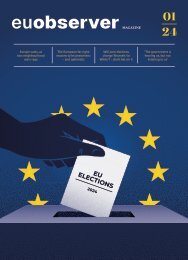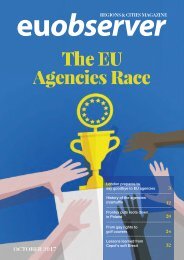Separatism: Making Europe stronger?
The 2014 edition of EUobserver's Regions & Cities magazine looks at separatist movements across Europe and its impact on the union.
The 2014 edition of EUobserver's Regions & Cities magazine looks at separatist movements across Europe and its impact on the union.
You also want an ePaper? Increase the reach of your titles
YUMPU automatically turns print PDFs into web optimized ePapers that Google loves.
Russkiy Mir<br />
in theEU<br />
Autonomy is not interesting to Russians in Latvia because it won’t<br />
solve their poverty: A report on mini-Russia inside the <strong>Europe</strong>an<br />
Union.<br />
By: Andrew Rettman<br />
Welcome to Latgale in south-east<br />
Latvia: If there is any EU region which<br />
looks like a soft target for Russianmanufactured<br />
separatism, this is it.<br />
The street names may be in Latvian,<br />
but most people - more than 70 percent<br />
in the regional capital Daugavpils - are<br />
of Russian origin.<br />
They lived here for generations or<br />
they were shipped in by Stalin.<br />
coalitions.<br />
Meanwhile, the countryside is littered<br />
with skeletons of Soviet-era factories.<br />
Miroslav Mitrofanov - who was born<br />
in Latgale and who co-chairs Latvia’s<br />
second biggest Russian-Latvian party,<br />
the PCTVL - says neglect by Riga and<br />
the EU means 20 percent have left in<br />
search of jobs.<br />
destined for greatness.<br />
For his part, Konstantin Dolgov, a<br />
senior Russian diplomat, in a speech<br />
in Riga in September claimed Latvia<br />
will shortly “liquidate” Russian<br />
language schools.<br />
At the same time, Latvian security<br />
police says Moscow is working with<br />
at least 12 NGOs or fringe parties<br />
in Latvia - some of which have<br />
demanded Latgalen autonomy - in<br />
We feel like<br />
“second-class<br />
people”<br />
Older residents speak only Russian.<br />
Old and young consume only Russian<br />
media, read Russian history books, go<br />
to see Russian plays, and celebrate<br />
Russian holidays.<br />
They tend to work in Russian-language<br />
offices and many go back and forth<br />
across the Russian border, which is<br />
still being demarcated, without a visa.<br />
But they cannot get a Latvian<br />
passport, or vote, unless they learn<br />
Latvian. Their children can do only half<br />
their classes in their mother tongue<br />
and their MPs are locked out of ruling<br />
We feel like “second-class people”<br />
Russian media was never kind to<br />
Latvia. But since the Ukraine war,<br />
Latgalens hear on TV that EU-backed<br />
“neo-Nazis” are slaughtering Russians<br />
in east Ukraine and that Latvia is<br />
sponsoring “a rebirth of fascism”.<br />
They also hear that Russian leader<br />
Vladimir Putin is ready to protect the<br />
“Russkiy Mir”.<br />
The phrase, which means “Russian<br />
World”, refers to ethnic Russians<br />
inside or outside Russia, but it also<br />
refers to a resurgent myth: that the<br />
Russian civilisation is unique and<br />
what it calls the “most significant threat<br />
to [Latvia’s] constitutional order”.<br />
It also says Russian intelligence is<br />
recruiting border smugglers as agents.<br />
Protesters have four times in recent<br />
months marched round Riga with<br />
Russian and Ukrainian rebel flags.<br />
Latgalen residents have also told<br />
Latvian TV the Russian embassy in<br />
Riga is helping people go to Ukraine<br />
to fight for Russia.<br />
10 REGIONS & CITIES 2014


















